“We don’t just sit all day and fill out worksheets. At KAS,
we listen to each other’s ideas!”
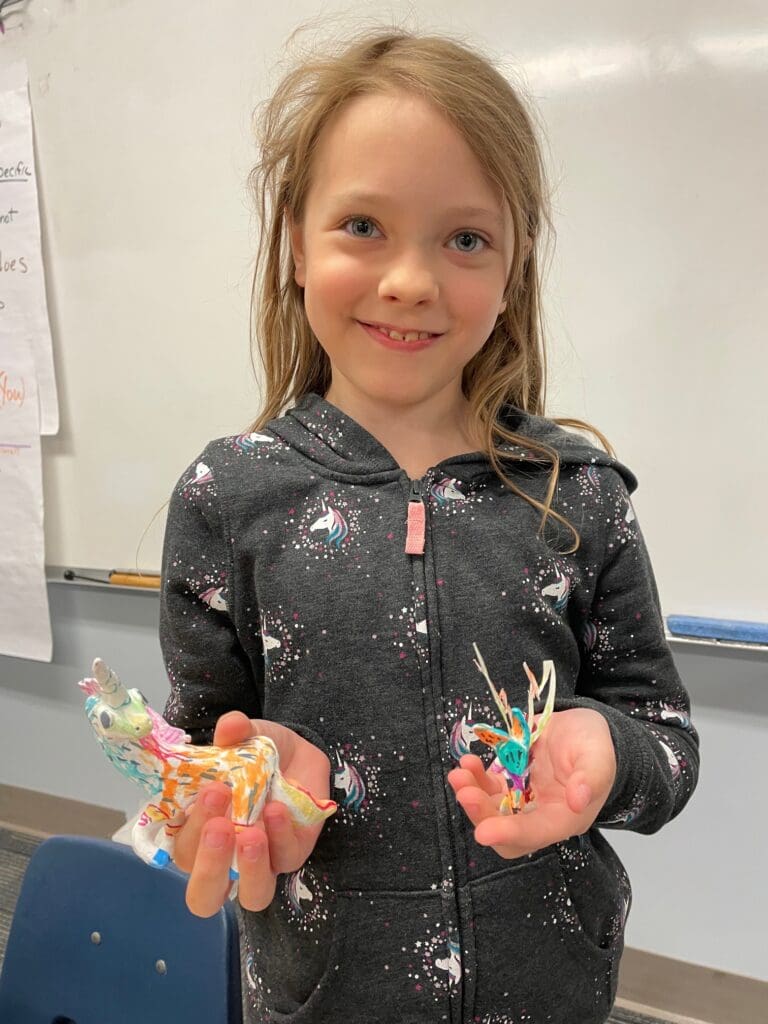
Overview
The curriculum at Kentucky Avenue School is driven by a constructivist philosophy rooted in the principles of Responsive Classroom. Constructivism is a philosophy of learning founded on the premise that, by reflecting on our experiences, we construct our own understanding of the world in which we live. Learning is a search for meaning. Therefore, learning must start with the issues around which students are actively trying to construct meaning. The purpose of learning is for an individual to construct their own meaning, not just memorize the “right” answers and regurgitate someone else’s meaning. Constructivism promotes using curricula customized to the students’ prior knowledge. Also, it emphasizes hands-on problem solving. Under the theory of constructivism, educators focus on making connections between facts and fostering new understanding in students. Instructors tailor their teaching strategies to student responses and encourage students to analyze, interpret, and predict information. Teachers also rely heavily on open-ended questions and promote extensive dialogue among students. To this end the curriculum at Kentucky Avenue School is fluid and flexible. We practice the science of reading utilizing the five pillars of reading instruction: phonemic awareness, phonics, vocabulary, fluency, and comprehension. Students are grouped according to their needs.
The curriculum is constructed using the Understanding by Design process as delineated by educational theorists Grant Wiggins and Jay McTighe with careful thought given to differentiated instruction. Teachers use the backward design model, which centers on the idea that the design process begins with identifying the desired results and then working backwards to develop instruction rather than using the traditional approach, which is to define what topics need to be covered.
The instructors at Kentucky Avenue School believe that the social curriculum is as important as the academic curriculum and have adopted the Responsive Classroom/Developmental Design approach to this end.
Curriculum by grade
A primary goal of the Kindergarten program is to create a community in the classroom where children recognize and value the strengths and interests of themselves and of others. We believe that social education is as important as the academic curriculum. We recognize play as an integral part of a child’s development. Consequently, our program fosters a balance of play and academic work. We believe that the greatest cognitive growth occurs through social interaction. Children learn the most when they are engaged in meaningful ways with others. We believe that how children learn is as important as what they learn. Therefore, we strive for a balance between teacher-directed and child-initiated experiences. Children have an opportunity each day to initiate learning and explore ideas based on their interests in open en and have the ded ways, while working together to communicate ideas, collaborate, and build understanding. Students explore the elements of reading, literature, music, art, social justice, science and mathematics. We explore ideas surrounding changes in seasons and traditional seasonal celebrations and engage in related activities and projects, while remaining flexible to encompass emergent learning through children’s ideas and interests.
The children also begin their study of Spanish with two sessions per week. Our Kindergarten students have opportunities to work with children in our primary grades program. The children participate in community service projects throughout the year. Kindergarten students also attend our weekly whole school assembly and have the opportunity to be the classroom representative, sharing a highlight from the week.
In the elementary grades, as in the kindergarten program, social interaction and the development of the social skills of cooperation, assertion, respect, empathy, and self-control are given critical attention. Understanding that children learn at different rates and in different ways, differentiated instruction is key to the elementary program.
Students participate in whole group lessons, flexible small group instructions based on need or work independently.
Science and social studies units are designed to engage students in hands-on learning. Students might be exploring Pittsburgh, making toothpaste, creating an electrical circuit, or developing a video about the planets.
As we are located in the city schools, students have the opportunity to explore the city of PIttsburgh in many ways. Whether it’s a trip to Point Park to explore the area’s rivers or an adventure on the PRT to the Carnegie Museum of Art to investigate Egyptian artifacts.
Daily outdoor recess is an important part of each day’s activities. The students use Mellon Park as their outdoor space for physical education during the warm months and the local Boys and Girls Club gym for physical activity in the winter.
The intermediate program at KAS provides students with the structure they need to become independent learners while continuing to emphasize creativity and collaborative problem solving. Our students’ critical thinking skills are developed through inquiry-based science units, engineering
challenges, and maker education. Mathematics in fourth and fifth grade is differentiated and combines an inquiry approach with structured skills practice, games, and projects using the Math in Focus curriculum.
Our students read and write across the curriculum, and ELA instruction includes the study of novels, such as Out of My Mind and Esperanza Rising, through literature discussion groups as well as individualized reading through book clubs and reader’s workshops. Students advance their writing skills through writer’s workshop projects that include opinion, persuasive and narrative writing, as well as poetry. Writing projects are integrated with literature, science, and social studies topics. Spelling in grades four and five is differentiated to meet each individual student’s needs.
Organizational skills are emphasized in the intermediate grades, in preparation for middle school. Our students continue to practice cursive handwriting, but also receive instruction in proper keyboarding skills.
Intermediate grade students participate in Spanish class, and have music, art and drumming courses throughout the week. Our students begin to take on more of a leadership role in the school as well, as they are stewards of some of our shared spaces and also spend time working one-on-one with their buddy class.
In addition, the students participate in daily outdoor recess and a formal physical education class once a week. Physical education is held at Mellon Park when weather permits, and at the Shadyside Boys and Girls Club during the colder months.
The middle school curriculum is designed to have students arrive at understanding. We believe that all learning comes from creating meaning. Therefore, the curriculum is designed to enable students to use and create information. The middle school uses a multi-age approach to foster a sense of community. As in the primary grades program, the middle school curricula hold to the principles of Responsive Classroom as delineated in the Developmental Designs program. Each morning, students participate in the Circle of Power and Respect to develop a sense of commonality and community.
Curricula in the areas of science, social studies, and language arts are presented in a three-year cycle. Our signature Humanities program use an interdisciplinary thematic approach to foster greater connectivity and understanding. Humanities combines the traditional Language Arts & Social Studies classes in order to help students focus deeply on three skill areas: reading, writing, and critical and creative thinking.
Throughout the year, our middle school students are encouraged to examine relationships between people and works of literature, as well as multiple perspectives using the lens of social justice. Children are encouraged to “find their voice” through current events lessons as well.
As part of the science curriculum, students learn the fundamentals of robotics. Math and Spanish are largely sequential in nature and taught at the respective levels in sixth, seventh, and eighth grades. In math, students move from a pre-algebra to algebra course with some students opting to take an additional geometry program. Students who excel in math are moved to the next level.
Our Science and STEAM classes employ hands-on, inquiry based learning methods. Students develop an understanding of concepts presented through observation, inquiry, research, experimentation, and discovery.
As part of the music curriculum, students in middle school learn to play the guitar. The school uses the services of Calliope: Pittsburgh’s Folk Music Society. Students have a formal art class once a week.
As in the intermediate grades, the middle school uses the facilities at Mellon Park and the local Boys and Girls Club for their physical education classes. Students continue to develop skills in relation to the team sports of baseball, softball, and basketball.
Curriculum by subject
Kindergarten
- Plants and Animals, Weather, Pushes and Pulls, *Observations-what are they how do we use them
1st Grade
- Animals (sorting, environments, adaptations), Solar system, forces and motion, magnets, plants, scientific method beginnings – what do scientists do?
2nd Grade
- Scientific Method, Matter Stages/Matter Characteristics, Landforms; Ecosystems
3rd Grade
- Weather and Climate, Forces and Motion, Growth and Development of organisms
4th Grade
- Vision & Light; Waves, Energy, and Information, Engineering Challenges
5th Grade
- Environmental Detectives, Patterns of Earth & Sky, Engineering Challenges
6th, 7th, 8th Grade
- Year 1- Life Science (23-24): Microbiome, Metabolism, Traits and Reproduction, Populations and Resources, Matter and Energy in Ecosystems, Natural Selection, Evolutionary History
- Year 2- Physical Science (22-23): Harnessing Human Energy, Force and Motion, Magnetic Fields, Thermal Energy, Phase Change, Chemical Reactions, Light Waves
- Year 3- Earth Science (21-22): Geology on Mars, Plate Motion, Rock Transformations, Earth, Moon, and Sun, Ocean, Atmosphere, & Climate, Weather Patterns, Earth’s Changing Climate
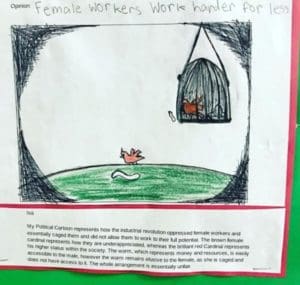
One of KAS’s 4 Guiding Principles is a social justice and civic engagement emphasis. We commit to a social justice curriculum that promotes a culture of service, responsibility, and civic engagement. Our goal as a learning community is to foster open and honest dialogue. We celebrate and value diversity and difference, and acknowledge that not all members of our community enjoy the same privileges, historically and presently.
Social Justice has a presence throughout the school curriculum. In Language Arts and in our Library materials, we strive to embody the words of Dr. Rudine Sims Bishop: “Books are sometimes windows, offering views of worlds that may be real or imagined, familiar or strange. These windows are also sliding glass doors, and readers have only to walk through in imagination to become part of whatever world has been created or recreated by the author. When lighting conditions are just right, however, a window can also be a mirror. Literature transforms human experience and reflects it back to us, and in that reflection we can see our own lives and experiences as part of a larger human experience.” KAS believes students should both see their own lives represented and encounter new lived experiences in their school reading.
Social Studies offers students the opportunity to think critically about their world, and especially, to develop the awareness that history can be interpreted by the teller. We seek out primary sources and scholarship by underrepresented voices to hear these stories from their own points of view.
Social Justice topics of study have included:
- Indigenous boarding school experiences
- Women, LGBTQ+, and Black Americans in the Revolution
- Climate injustice (the greater effects of climate change on poor and less-privileged individuals worldwide)
- The intersectionality of poverty and physical and mental health, language, ethnic or racial background, gender, sexuality, age, and disability
- Individual research opportunities, such as National History Day.
Students prepare themselves to be leaders of change by learning how to present their opinions in writing, images, and speech. They make mock ballots for elections and justify their choices. They are encouraged to join in real-world activism, such as by holding fundraisers for Ukrainian refugees and joining protests demanding that students be safe from guns at school.
KAS students learn to ask questions about power: who has it, how they have acquired it, and what they are doing with it. They learn that we all have some power, and it is up to us to use it well.
Kindergarten
- Rules, Community, Calendar/time, Geography, Families, Holidays/Traditions, Geography (Pittsburgh)
1st Grade
- Mapping, Geography (continents and oceans), community, heritage, immigration, multicultural holidays and traditions,
Individual growth/socio-emotional – kindness, how do we approach mistakes, conflict resolution
2nd Grade
- Responsibilities/rules, Communities (school, local-leadership,govt,), Mappinggeography, Pittsburgh history
3rd Grade
- Pennsylvania State History (w/ artifacts, places, people), Regions of PA, Regions of U.S., states and capitals
4th-5th Grade
- Year 1: Pre-1800s America: Native Americans, Colonization, 13 Colonies, French and Indian War, American Revolution, US Government/Constitution
- Year 2: 1800-1900: Road to the Civil War (reviewing Constitution, economics/plantation), Civil War, Reconstruction/Jim Crow, Westward Expansion
6th-7th-8th Grade
- Year 1: Culture+ Geography- Ancient world (Egypt, Greece, Rome), Middle Ages (Feudalism – Japan, Europe; Silk Road – Asia)
- Year 2: Citizenship and Belonging- Immigration (Angel, Ellis Island), Holocaust and Japanese Interment, US Civil Rights Era, Global Rights
- Year 3: Economics- Industrial Revolution, Global Poverty, Medieval Islam, Mansa Musa, Imperialism in Asia, Climate/Economics
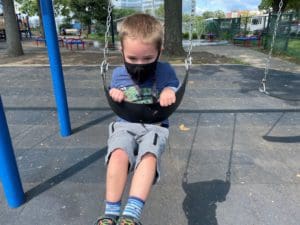
Kentucky Avenue School uses the facilities of its neighborhood for its physical education program. Mellon Park is home to KAS from September to November and again from April to June. Students in the primary grades avail themselves of the playground equipment: climbing. swinging, and at times enjoying the water park activities. It is softball season for the students in grades four through eight. Students learn the fundamentals of softball and play at various positions rotating throughout the season. Walking to and from the park provides additional exercise for the students.
The Shadyside Boys and Girls Club is home to KAS in the winter months. From December to March students use the gym at the Boys and Girls Club for a variety of activities. The primary grade students stretch, do yoga and play a variety of creative tag and ball games, focusing on team building and cooperation while building gross motor capabilities.
It is basketball season for the students in grades four through eight. Students learn the fundamentals of basketball as they engage in playing the game. Once again the walk to and from the Boys and Girls Club provides additional exercise for the students.
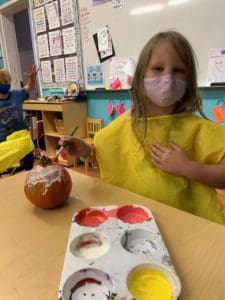
Art classes at KAS are often spent with students out of their seats: communicating, problem solving and working collaboratively.
Learning happens in the act of making⸺the process is more important than the product. By emphasizing the process and encouraging exploration and divergent thinking, students discover there is no one right answer to a problem.
When beginning a new project, we often start with a lesson in art history. We move on to a class discussion of the artwork and the concepts found therein, learning how to speak about art and think critically about what we see.
Our student artists explore a wide variety of media and techniques, becoming versed in the elements of art and design, understanding the power of utilizing them to communicate ideas.
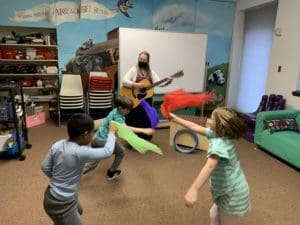
Musical experiences, especially those that happen in a group, can be a great parallel for life. They help build community through encouraging active listening and creativity. They can also provide opportunities to develop important life skills like self-expression, patience, responsibility, and teamwork.
At KAS, the goal of each music class is to provide a safe and welcoming environment for our young musicians to grow emotionally, mentally and physically as they enjoy music and develop their individual musicality.
During music class, students are exposed to rich musical traditions from around the world as they engage in singing, movement, folk dancing and listening activities. Students also learn about / use various musical instruments and explore different facets of music theory as the year progresses.

Here at KAS emotional and social learning goes hand and hand with our students’ academics. With this in mind our school behavioral therapist works closely with the teachers to not only provide support for students, but for families and staff as well. In order for students to learn and to be successful, they must be provided with a safe and supportive environment. By creating an environment of growth and understanding where students and staff can feel able to share and cope with their mental health, we can empower them to be their best selves and to reach their goals.
What we offer at KAS: